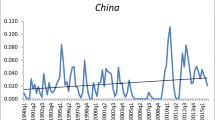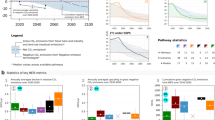Abstract
In this essay I argue that the research on emission scenarios over the past few years has focused on low emission scenarios while producing few medium level emission scenarios. As a consequence, there is a gap in the literature on emission scenarios which prohibits answering several basic questions. This relative lack of medium emission scenarios is problematic for three reasons. First, scientific integrity, as the research community should produce scenarios along the full range of future options. Second, there is currently a very limited number of scenarios that describe real-world conditions of imperfect climate policy combined with technology restrictions. Finally, I observe a growing mismatch between the mitigation research focus on low emission scenarios and research to impacts and adaptation on medium and high emission scenarios. If this trend continues, it will be difficult to draw overarching conclusions from mitigation and impacts research in IPCCs 6th Assessment Report. Therefore, this essay ends with several recommendations for the mitigation research community to stimulate production and publication of medium level emission scenarios.
Similar content being viewed by others
Notes
In this paper, I define low emission scenarios as stabilizing below or around 3.7 W/m2.
Another 26 % of the scenarios in the database are high emission scenarios around RCP6.0 and RCP8.5.
References
Anderson K (2015) Duality in climate science. Nature Geosci 8:898–900. doi:10.1038/ngeo2559
Blanford G, Merrick J, Richels R, Rose S (2014) Trade-offs between mitigation costs and temperature change. Clim Chang 123:527–541. doi:10.1007/s10584-013-0869-2
BRACE (2015) Benefits of Reduced Anthropogenic Climate Change: https://chsp.ucar.edu/brace-benefits-reduced-anthropogenic-climate-change. National Center for Atmospheric Research, Boulder, CO, USA
Clarke L, Edmonds J, Krey V, Richels R, et al. (2009) International climate policy architectures: Overview of the EMF 22 International Scenarios. Energy Econ 31:S64–S81. doi:10.1016/j.eneco.2009.10.013
Clarke L, Jiang K, Akimoto K, Babiker M, et al. (2014) Assessing Transformation Pathways.. in Edenhofer O, Pichs-Madruga R, Sokona Y, Farahani E, Kadner S, Seyboth K, Adler A, Baum I, Brunner S, Eickemeier P, Kriemann B, Savolainen J, Schlömer S, von Stechow C, Zwickel T, Minx JC (eds.) Climate Change 2014: Mitigation of Climate Change. Contribution of Working Group III to the Fifth Assessment Report of the Intergovernmental Panel on Climate Change Cambridge University Press, Cambridge, United Kingdom and New York, NY, USA
Criqui P, Kitous A, Berk MM, den Elzen MGJ, et al. (2003) Greenhouse gas reduction pathways in the UNFCCC Process up to 2025. Technical Report. European commission, DG environment, Brussels.
den Elzen MGJ, Lucas PL (2005) The FAIR model: A tool to analyse environmental and costs implications of regimes of future commitments. Environ Model Assess 10:115–134
EC-JRC (2015) Analysis of scenarios integrating the INDCs. JRC Policy Brief. European Commission, Joint Research Centre
Hallegatte S, Rogelj J, Allen M, Clarke L, et al. (2016) Mapping the climate change challenge. Nature Clim Change 6:663–668. doi:10.1038/nclimate3057
Höhne N, den Elzen M, Weiss M (2006) Common but differentiated convergence (CDC): a new conceptual approach to long-term climate policy. Clim Pol 6:181–199
Hulme M (2016) 1.5 °C and climate research after the Paris Agreement. Nat Clim Chang 6:222–224. doi:10.1038/nclimate2939
IEA (2015) Energy and climate change - World energy outlook special briefing for COP21. IEA, Paris.
IPCC (2016) Decisions adopted by the panel. 43rd session of the IPCC, Nairobi, Kenya.
Keith W, Hermann L-C, Ronald S, Andrzej T, et al. (2015) Climate change impacts on agriculture in 2050 under a range of plausible socioeconomic and emissions scenarios. Environ Res Lett 10:085010
Krey V, Clarke L (2011) Role of renewable energy in climate mitigation: a synthesis of recent scenarios. Clim Pol 11:1131–1158. doi:10.1080/14693062.2011.579308
Krey V, Masera O, Blanford G, Bruckner T, et al. (2014) Annex II: Metrics & Methodology. in Edenhofer O, Pichs-Madruga R, Sokona Y, Farahani E, Kadner S, Seyboth K, Adler A, Baum I, Brunner S, Eickemeier P, Kriemann B, Savolainen J, Schlömer S, von Stechow C, Zwickel T, Minx JC (eds.) Climate Change 2014: Mitigation of Climate Change. Contribution of Working Group III to the Fifth Assessment Report of the Intergovernmental Panel on Climate Change. Cambridge University Press, Cambridge, United Kingdom and New York, NY, USA
Kriegler E, Tavoni M, Aboumahboub T, Luderer G, et al. (2013) What does the 2 °C targen imply for a global climate agreement in 2020? The limits study on Durban platform scenarios. Climate change economics 04:1340008 doi:10.1142/S2010007813400083
Kriegler E, Weyant J, Blanford G, Krey V, et al. (2014) The role of technology for achieving climate policy objectives: overview of the EMF 27 study on global technology and climate policy strategies. Clim Chang:1–15. doi:10.1007/s10584-013-0953-7
Kriegler E, Riahi K, Bauer N, Schwanitz VJ, et al. (2015) Making or breaking climate targets: The AMPERE study on staged accession scenarios for climate policy. Technol Forecast Soc Chang 90(Part A):24–44. doi:10.1016/j.techfore.2013.09.021
Riahi K, Kriegler E, Johnson N, Bertram C, et al. (2015) Locked into Copenhagen pledges — Implications of short-term emission targets for the cost and feasibility of long-term climate goals. Technol Forecast Soc Chang 90(Part A):8–23. doi:10.1016/j.techfore.2013.09.016
Riahi K, van Vuuren DP, Kriegler E, Edmonds J, et al. (2016) The shared socioeconomic pathways and their energy, land use, and greenhouse gas emissions implications: an overview. Glob Environ Chang. doi:10.1016/j.gloenvcha.2016.05.009
Rogelj J, den Elzen M, Höhne N, Fransen T, et al. (2016) Paris agreement climate proposals need a boost to keep warming well below 2 °C. Nature 534:631–639. doi:10.1038/nature18307
Rosenzweig C, Elliott J, Deryng D, Ruane AC, et al. (2014) Assessing agricultural risks of climate change in the twenty-first century in a global gridded crop model intercomparison. Proc Natl Acad Sci 111:3268–3273. doi:10.1073/pnas.1222463110
Schellnhuber HJ, Frieler K, Kabat P (2014) The elephant, the blind, and the intersectoral intercomparison of climate impacts. Proc Natl Acad Sci 111:3225–3227. doi:10.1073/pnas.1321791111
Spencer T, Pierfederici R, Waisman H, Colombier M, et al. (2015) Beyond the Numbers. Understanding the Transformation Induced by INDCs. IDDRI - MILES Project Consortium, Paris, France
Tavoni M, Kriegler E, Aboumahboub T, Calvin K, et al. (2013) The distribution of the major economies' effort in the Durban platform scenarios Climate Change Economics 04:1340009 doi:10.1142/S2010007813400095.
UNFCCC (2015) COP21 Adoption of the Paris Agreement, FCCC/CP/2015/L.9/Rev.1
Acknowledgments
I am thankful to Brian O’Neill from the National Center for Atmospheric Research (NCAR) in Boulder, CO, USA for discussions on this work and Elmar Kriegler from the Potsdam Institute for Climate Impacts Research (PIK), Potsdam, Germany, for providing the set of debiased scenarios from the IPCC database. Comments from the reviewer were well appreciated and have greatly improved this essay.
Author information
Authors and Affiliations
Corresponding author
Additional information
The National Center for Atmospheric Research is sponsored by the National Science Foundation
Rights and permissions
About this article
Cite this article
van Ruijven, B.J. Mind the gap – the case for medium level emission scenarios. Climatic Change 138, 361–367 (2016). https://doi.org/10.1007/s10584-016-1744-8
Received:
Accepted:
Published:
Issue Date:
DOI: https://doi.org/10.1007/s10584-016-1744-8




